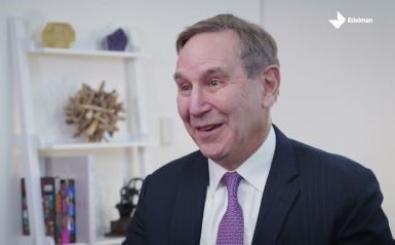German Chancellor Angela Merkel’s 16-year long reign is coming to an end after the elections on September 26. Edelman Global Advisory experts assess the upcoming political changes companies and organizations can expect. This piece provides an analysis of how changing German-Franco power dynamics could affect the EU following one of the most crucial German elections in decades.
Germany and France are the closest allies in Europe and continue to be the most critical actors in accelerating European integration. As Germans vote for the next German parliament, German-Franco relations are set to redefine their bilateral priorities. All three leading candidates to succeed Merkel, including Armin Laschet (CDU/CSU), Annalena Baerbock (The Greens), and Olaf Scholz (Social Democrats), have outspokenly underlined the need for even closer alignment with France, but despite this commitment, some fundamental underlying issues remain unsolved.
As opinion polls point to an increasingly wide-open race between the three candidates, coalition negotiations could prove lengthy. Following the previous elections in 2017, where negotiations dragged on for over five months, it may take some time before a new government is finally formed. As a result, it is possible that Germany is left without a new government until March 2022, as France’s presidential elections cycle begins to take place in April, creating a substantial power vacuum which may slow down the Franco-German tandem. The big question, therefore, is what this will mean for the big-ticket challenges facing the European Union in the geopolitical age?
Franco-German relationship in a post-Merkel Europe
With both the German and French election results uncertain, Europeans are again left to ponder what lies ahead, and what shape a post-Merkel world may take.
With the UK having left the club, the German-Franco partnership has gained in importance, together with the so-called “frugal four” of Austria, Denmark, the Netherlands and Sweden, and the more restive Euro-skeptic Eastern bloc led by the so-called Visegrád Group of Czechia, Hungary, Poland, and Slovakia. France has also tried to diversify its alliances, actively spearheading the Eastern Mediterranean amid tensions over gas drilling. France is also notably restoring strong ties to Italy with the signing of the Quirinal Treaty, which is set to bolster cooperation between France and Italy, adding fresh impetus to the European project. But as France powers ahead with defining new spheres of influence, Germany continues to create consistency and leadership at the helm of the EU project. The question that remains on many lips, is how will this change under a new Chancellor?
For business, the German elections will be about restoring the leadership needed to foster an effective EU. Yet this transition will need to take place during a time when trust in leaders is at an historic low (2021 Edelman Trust Barometer). Berlin and Paris will also need to inject some much-needed dynamism – leveraging the € 750 billion NextGenerationEU recovery plan - to launch a competitive revival. The list of issues, however, remains to be as long as the areas of agreement.
Berlin and Paris will continue to agree to disagree while seeking ever closer cooperation
Germany is likely to continue its fondness for preserving the status-quo in fiscal policy under a Conservative Chancellor. For Chancellor Scholz, fiscal policy is unfortunately still being written in the stars. He has repeatedly backed a conservative public spending policy before the pandemic and it is broadly expected that he will remain ambiguous, allowing him to keep all Conservative (CDU/CSU, FDP) and left-wing (Greens, The Left) coalition scenarios on the table. It is however a left-wing coalition scenario that could in fact shift Germany to a more French-aligned position. A lot would need to happen to have this outcome realized.
Similarly, in climate policy, the future of nuclear power will continue to remain a point of divergence. French President Emmanuel Macron plans to continue using nuclear energy intensively in France while pushing for it to be declared as a green source of energy under the EU’s sustainable finance taxonomy. This goes against opposition from Germany’s current outgoing government, and with the notably anti-nuclear Greens set to be involved, this opposition is likely to continue – and possibly sharpen, with calls for an all-out ban. This should not underestimate, that Germany is set to push for an international climate alliance – an initiative driven by lead Chancellor candidate Olaf Scholz (SPD). Germany and France will also be at the forefront of institutionalizing climate cooperation with the US and China. Similarly, it is expected that Berlin and Paris will push for an EU carbon border tax – an initiative that will likely face resistance from the Liberals.
Major differences will continue to exist between Berlin and Paris in shaping a European defense policy, regardless of the coalition scenario. Germany traditionally views with skepticism the feasibleness of European “strategic autonomy”, a term Macron coined to call for more independent EU military capabilities. So far neither the more NATO-aligned Conservatives nor the Social Democrats signaled a significant pivot to the French position. However, a coalition involving the Greens might find it more attractive to increase defense spending at EU rather than national level. A “traffic light coalition” between SPD, Greens, and the Liberals could be more receptive to bolstering European defense capabilities than the Conservatives ever have been, though the SPD and Greens will likely oppose common defense projects where autonomous armed drones are in play.
Only a close Franco-German partnership will magnify Europe’s global role
President Macron recently underlined that the Franco-German partnership remains crucial, not only for the EU but also internationally, notably in the context of the Afghan crisis, where France and Germany are set to launch an initiative to coordinate their response to possible migration flows. In the context of its EU Council Presidency in the first half of 2022, France will hope that it can count on whichever coalition government emerges to nurture a European Union capable of competing on the global stage and with the ambition to lead through a “third way”.





